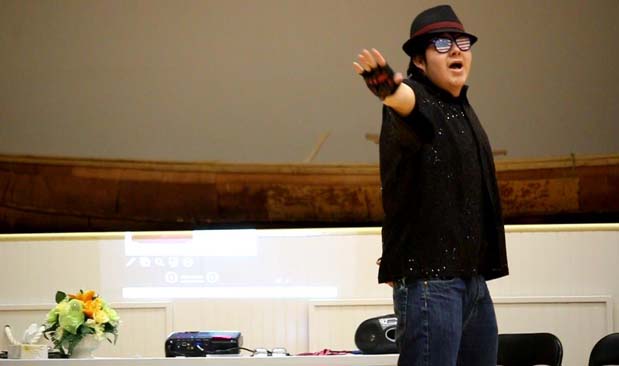‘No Shame, No Blame’ FASD conference aims to bring awareness

By Leslie Knibbs
SERPENT RIVER – The North Shore Tribal Council (NSTC) held its fifth annual Fetal Alcohol Spectrum Disorder Conference at the Serpent River First Nation Lifestyles Centre in Cutler on March 3. Delegates included educators, parents and health care professionals from Sault Ste. Marie to Sudbury. All shared stories and attended workshops to create more public awareness of FASD, a disorder caused by maternal drinking of alcohol while pregnant. The theme of this year’s conference was “No Shame, No Blame, FASD Affects Us All.” The lives of keynote speakers Annette and Daniel Cutknife provided an unmitigated and ideal template to follow for those confronting and dealing with the challenges of shame, blame and redemption, when burdened with facing FASD on a personal level.
According to recent literature, FASD affects 10 per cent of children in Canada. This life long disability results in health issues such as birth defects as well as brain damage resulting in lack of cognitive abilities, and, in some cases, trouble with the law.
Keynote speakers Annette and her 26 year-old son Daniel Cutknife from Samson Creek First Nation in Alberta spoke with firsthand experience to delegates on feelings of guilt, shame, and, redemption when coping with FASD. Daniel has suffered with FASD since birth; his mother Annette, a recovering alcoholic has devoted her life to supporting him and helping others affected through her presentations on FASD.
In an article by Cutknife in “Living with FASD”, Cutknife said she gave birth to her son in October, 1988 and immediately noticed something was not right with her son. At the conference, she spoke first of denial of her son’s condition and her alcoholism. From the age of two months to five years old, Daniel was in the hospital regularly with respiratory ailments, and ear infections, all requiring many surgeries. According to Cutknife, Daniel has been under anesthetic at least 16 times. During the first three years of Daniel’s life, Cutknife managed her alcohol consumption focusing on caring to Daniel’s needs. Following the death of her brother on the first anniversary of his death, Cutknife resumed drinking heavily, finally sobering up in April of 1996.
After Daniel started kindergarten, his teacher became concerned and notified his mother about Daniel’s deficiencies in following simple instructions, hyper-activity, short attention span, and difficulty speaking. Shortly thereafter, Daniel was diagnosed with Fetal Alcohol Effects, (FAE) or moderate effects from maternal drinking while pregnant. From that point forward he had a personal aide to help him at school. Later during his teenage years, Daniel was re-assessed and diagnosed with FAS. At that time, Cutknife acknowledged she had not been honest about her alcohol consumption during the first diagnosis. According to Cutknife she had consumed alcohol 14 times while pregnant with Daniel consuming eight or more drinks each time.
The delegates at the conference enjoyed watching Daniel perform his own choreography and a spirited dance to the Bruno Mars song “Uptown Funk.” According to Cutknife, Daniel “likes to perform, this was his seventh or eighth time performing in public.” The mother and son have given at least 20 presentations on FASD since 2003, mostly in Alberta.
Currently, Daniel is working at and attending the “Horizons Centre” in the city of Wetaskiwin, Alberta where along with other adults with disabilities he is helping out in a soup kitchen and doing other jobs as needed, all giving him a sense of empowerment. However, Daniel continues to suffer from speech and language delays as well as hearing problems. Cutknife, referring to her son said, “I am very proud of him.” With all the challenges Daniel and his mother Annette have faced, and overcome, Daniel graduated from high school in 2008 and is experiencing a life of achievement as well as love from a mother who expressed it this way, “I keep positive and work hard on my recovery and do my ultimate best to be there for Daniel at all times. I love him dearly.”
Cutknife credits Daniel’s life to “early intervention which made a world of difference.” Suman Bavi, a clinical counselor from Anishnawbe Health Centre in Toronto told front line workers at a previous NSTC FASD conference, “the earlier a person is diagnosed, “the better opportunity for intervention, support and counselling,” and such is the case with Daniel Cutknife. Following their presentation in Cutler, the Cutknifes went to North Bay to make another presentation.
Within the last couple of years, the Sudbury Regional Hospital has become equipped and prepared to diagnose FASD patients enabling early intervention. Fortunately the current intake at the diagnostic clinic will be increased from two to between eight and ten patients within two months according the NSTC FASD co-ordinator Priscilla Southwind who was the lead person in organizing the conference.
When understanding the effect of FASD, perhaps David Eagleman, the renowned neuroscientist and leading researcher on FASD described how an FASD affected person functions mentally when he said, “most operations of the brain are inaccessible to awareness, such that the conscious mind is like a stowaway on a trans Atlantic steamship, taking credit for the journey without acknowledging the massive engineering underfoot.” Such is the case with an FASD affected individual with permanent brain damage, where normal brain function is inhibited. Simply put, a conscious mind, although an obvious controlling mechanism, is not the only trigger for actions and behaviour according to Eagleman.


